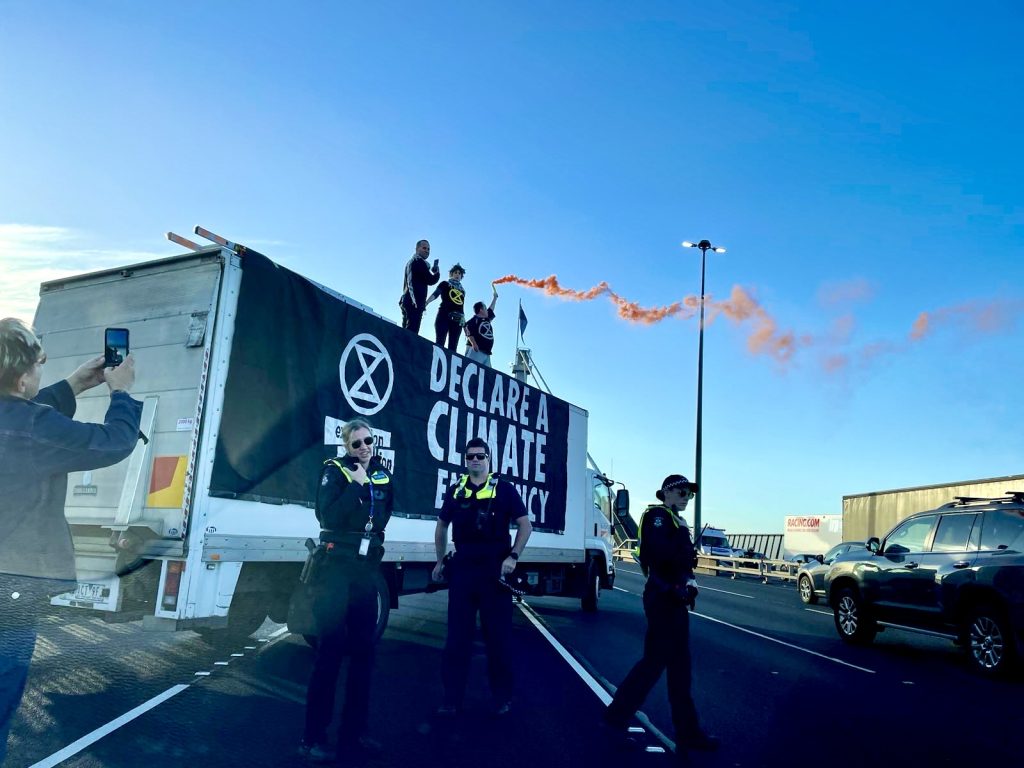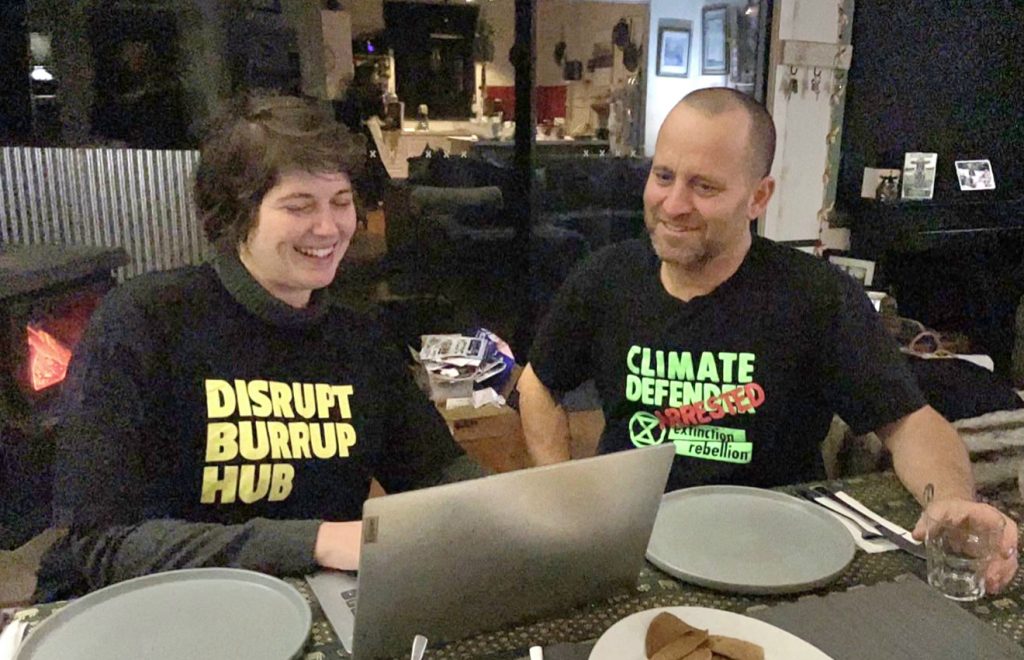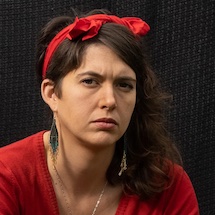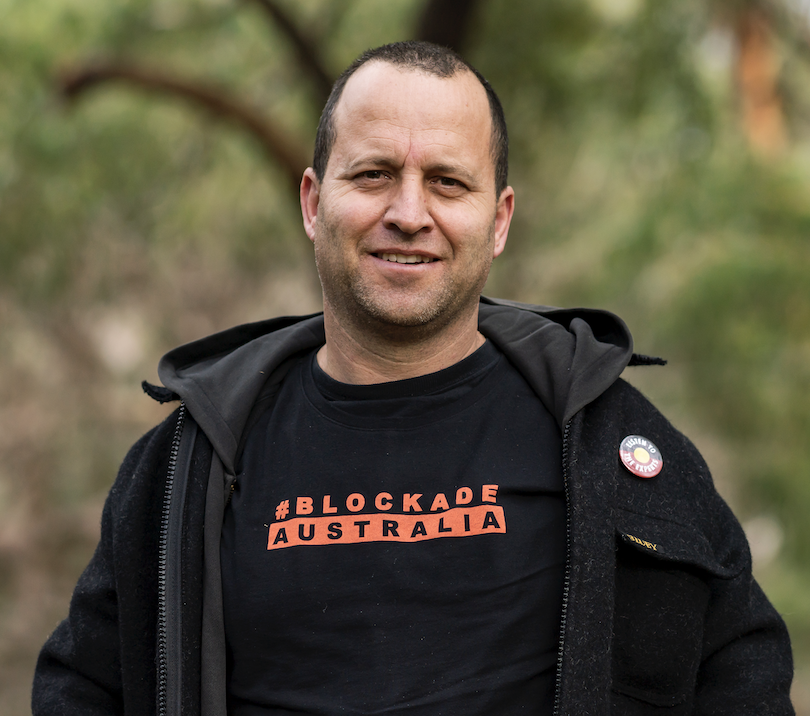Why we risk prison to protect what we love
Brad Homewood and Violet CoCo are climate activists and organisers with Extinction Rebellion. They recently served two months in prison for blocking the West Gate Bridge in Naarm/Melbourne to sound the alarm on the climate emergency.
The protest was a disruptive but peaceful demonstration that blocked three lanes of the West Gate Bridge on 5th March 2024. This article is both a conversation and collaboration between Brad and Violet about why they took such radical action, what prison was like for them, and what will come next for the ‘radical flank’ of the climate movement. This conversation started a week after the pair were released from custody and developed over a number of weeks as they debriefed from their experiences.
Violet: So, Brad what was it like being on top of the bridge?
Brad: I felt a strong sense of purpose being on top of the bridge. I knew we were doing the right thing for all the right reasons. It got quite intense at various times with some very angry drivers, understandably we don’t enjoy that part of it.
We wish we didn’t have to disrupt the public in the way that we did, but we wanted to do something that could not be ignored, and we knew that an action like that could not be ignored by the mainstream media and the political class. We’re sorry about any distress we caused, however I can honestly say I have no regrets about what we did, it was something that needed to be done.
Violet: Why did it need to be done?
Brad: It needed to be done because we are in a climate and ecological emergency. Professor Hans Schellnhuber says, we are literally in the “End Game” (1). UN Secretary-General António Guterres warns, “Climate breakdown has begun.” (2) Ecosystems around us are showing early signs of collapse (3). Those ecosystems are our life support systems, if they break down, then society, soon enough, will follow. I don’t want to live in a dystopia, I don’t want to live in a world where mass starvation becomes common and wars over ever-diminishing resources increase.(4)
I mean these wars are arguably already starting, I don’t want to live in that world, I don’t think any of us do, and the political class is failing to address the problem. There is a correlation between rising temperatures and aggravated violence. We saw how feral some people got with the toilet paper shortages, imagine what they will be like when there is no food on the shelves.(5)
Even the former head of the Australian Defense Force, Admiral Chris Barrie recently stressed that the government should be moving to an effective “wartime” footing on climate — instead, in the recently released National Defence Strategy, the government had dedicated ‘precisely two sentences of substance’ to climate impact.(6) Barrie and other experts assert that climate breakdown is a genuine threat to our national security – surpassed only by a nuclear war.(7)
Governments are failing in their duty of care to address climate breakdown, so the only place we can find hope is in a culture of resistance, hence why we did what we did.
Violet: What’s so poignant about this is that the warmer the planet gets the more violence we will see around the world, and the further we allow this trajectory to continue the harder it will get to live. People are already saying that they are too stressed out, too busy struggling to survive, to be engaged in politics right now. It scares me, the idea that if people are already disengaged because it’s too difficult and it’s only going to get harder, then we’re sort of committing ourselves to the trajectory of collapse.
I refuse to do that, I’ve got two young nephews who I feel incredibly responsible for. I want to see them thrive in this world. I want to see them be able to fulfil their dreams and I definitely don’t want to be looking down at them and seeing them starving and asking why I didn’t do more to avert the collapse. Knowing makes me responsible for change.
Brad: I think you raise a really important point there Violet, about how people are stressed out with the cost-of-living crisis and they can’t find capacity in their life to contribute to the movement. Unfortunately, the cost-of-living crisis is being driven largely by corporate profits and, it was recently revealed, also by rising insurance premiums, and those rising insurance premiums are being driven by climate breakdown!(8)
So the actual cost of living crisis is, in a significant part, being driven by the climate crisis. As that only gets worse then the cost-of-living crisis will only increase. So, like you said, it is never going to be easier to act than it is now, it’s only going to get harder, if we can’t do it now then how can we do it in the future?”
Violet: Well exactly Brad. But more than just insurance going up, more homes will be destroyed from climate breakdown. We are in a part of the world the scientists call ‘disaster alley’(9) so we are going to have many climate refugees within our borders. I mean, I know of people who were still living in tents years after the 2019-2020 bushfires. People are still in temporary accommodation from the 2022 floods. The housing crisis is in part due to the destructive weather as well.
But what really annoys me? If world leaders had actually dealt with carbon emissions and ecosystem protection when they said they would through the Paris climate agreements, then we wouldn’t have such a hard time of it now. But there has just been empty promises and hollow words.
Now we need an emergency speed transition, and repair, to avoid total breakdown, rather than the gradual transition it could have been. Plus, we have such a huge responsibility here on this continent because it is the third largest exporter of carbon emissions. We allow the fossil fuel industry to act like drug dealers extracting from this land and selling around the world. Newcastle, NSW, boasts the largest coal port in the world. (click here to join the disruption of this coal port.) Our native forests are being logged and shipped overseas or turned into wood chips. Our oceans polluted, over-fished, and decimated by gas exploration.
Let’s take a moment not to be human centric about this issue as well, we are looking at eco collapse, which means millions of unique and innocent creatures will become extinct due to human extractivism and pollution. Australia is currently leading the way in mammal extinction rates. It starts with the insects, then the lizards, then the birds and so on… I don’t want to be responsible in any way for a world without the magpie warble.(10) We have such a big responsibility here to care for the nature that we have left.
My late friend professor Will Steffen who was one of the top climate scientists on this continent said to me at a café in Canberra:
“Massive floods, fires and heatwaves are sending us a clear message. On our present trajectory, we risk heading into a collapse of our globalised civilisation and a precipitous drop in human population — put simply, hell on earth. But we can avoid this disastrous future if we change the way we think, live our lives and interact with the rest of the living world. This means listening to and respecting the wisdom of indigenous cultures and moving away from rampant consumerism.”
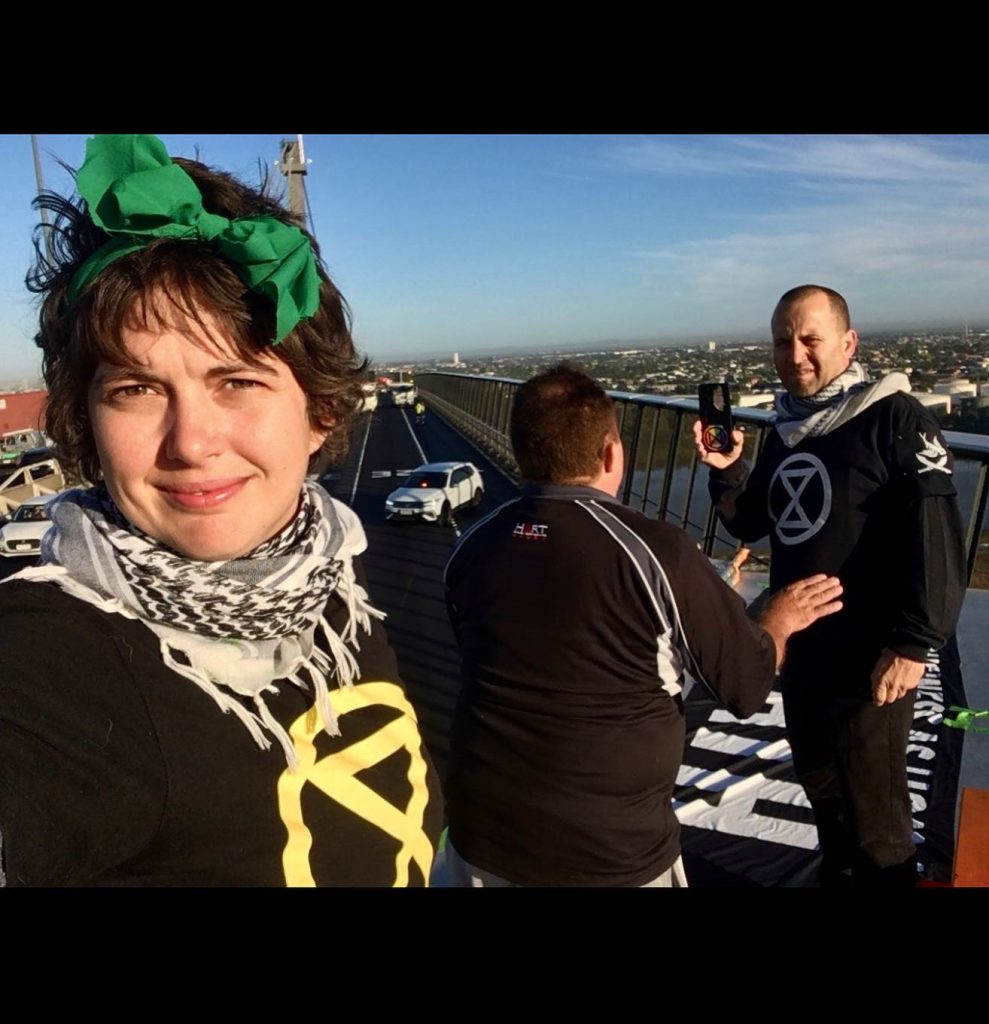
Brad: I think we should mention the team, the three of us couldn’t have done it on our own, could we Violet?
Violet: Yeah, we had a very sizable team for this action. We are extremely grateful to them. It may have looked like just the three of us on the bridge, but Joe, Brad and I were just one part of a high functioning team. People from all different walks of life working together. All doing our best to sound the alarm in a very proportionate way to the threat.
Community is really important when facing repression like prison. One of the state’s most powerful weapons is to separate us, so one of the most powerful things we can do is stay connected. I could not have survived the repercussions of this action, and still be so mentally well, without the support of community.
Brad: What was it like for you on the bridge Violet?
Violet: Well, its not my first truck jump on a bridge, so I was very in the moment, ticking off all the boxes. Do you remember that the banners wouldn’t stick because of morning condensation? You were on the live stream and Joe and I were madly drying the roof to make the tape stick. There were a few people calling out “you idiot”, others tooted and waved in support. We know our work is polarizing, by nature it’s supposed to drive out the conversation. If people are upset with the traffic and inconvenience of one protest, then they ought to be ropable about the devastation of climate breakdown.
Brad: Why civil resistance?
Violet: Emissions continue to rise. Even with all the scientific reports and all the promises, emissions continue to rise, and our biodiversity plummets. For 30 years we have been promised effective action to prevent the breakdown.(11) We are being lied to, with weasel words and greenwashing. The population has been lulled into a false sense of security in fake election promises, while the liveability of our planet is being extracted and turned into fast fashion and fidget spinners.
Civil resistance has a long and proud history of getting results when asking nicely hasn’t worked. We use strategic non-violence and sacrifice to win hearts and minds. It can swing the balance of power against an opponent, who often has the full might of the state behind them. Civil resistance takes strategy. It is not reckless or disruptive for the sake of it, planning a successful action takes a certain amount of finesse, experience and courage. The power of civil resistance lies in it being unignorable, creative and applying pressure to decision makers.
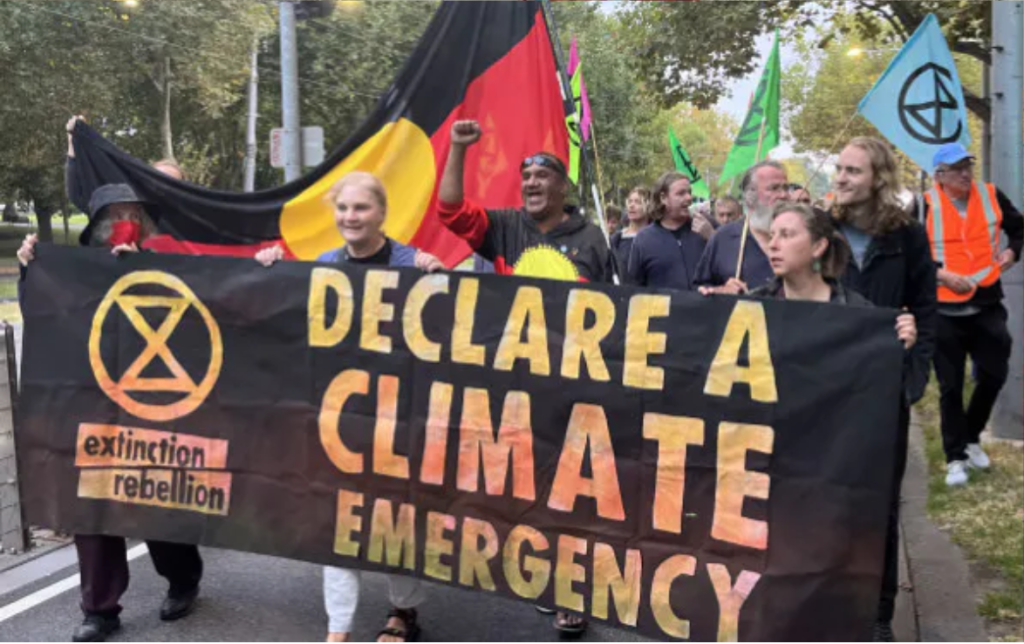
Image credit: ausrebellion.earth
Violet: Brad, we get a lot of people who think that what we do is counter-productive, what do you say to that?
Brad: While I was in prison, a lecturer from Monash University sent me a letter with the results of a recent peer reviewed study. It surveyed 24,535 people, published in the journal Nature Communications, and found conclusively that “concerns about climate change increase following climate protests”(12). It specifically mentioned Extinction Rebellion, the movement we are a part of. This is no surprise to anyone who has read the history of social change, but it’s nice to have it validated by the science.
There are many parts of the climate movement. Some more radical than others. Every successful movement throughout history has involved a radical flank who are prepared to take proportionate action to the suffering being experienced by the relevant issue. This is often seen as the pointy end of the movement that wedges open the debate for the more conservative and mainstream organisations to gain political ground. This is known as the ‘ratchet approach’ (McBay, 2019, p. 191).
Violet: What is the state of play in the current grass roots movement re laws and prison?
Brad: The climate movement is not in a strong position at the moment, and the need to build a mass movement has never been more desperate. But there are positive signs around the world as more people are being activated into resistance because of the horrific genocide being watched in real time. While this may be drawing activist energy, ourselves included, to the Free Palestine Movement. The people we meet on this frontline are clearly intelligent, compassionate, and committed people. Numbers have been strong and solid for 8 months now at both the Sunday rallies and smaller, more targeted actions at the local weapons manufacturers and politicians facilitating the genocide.
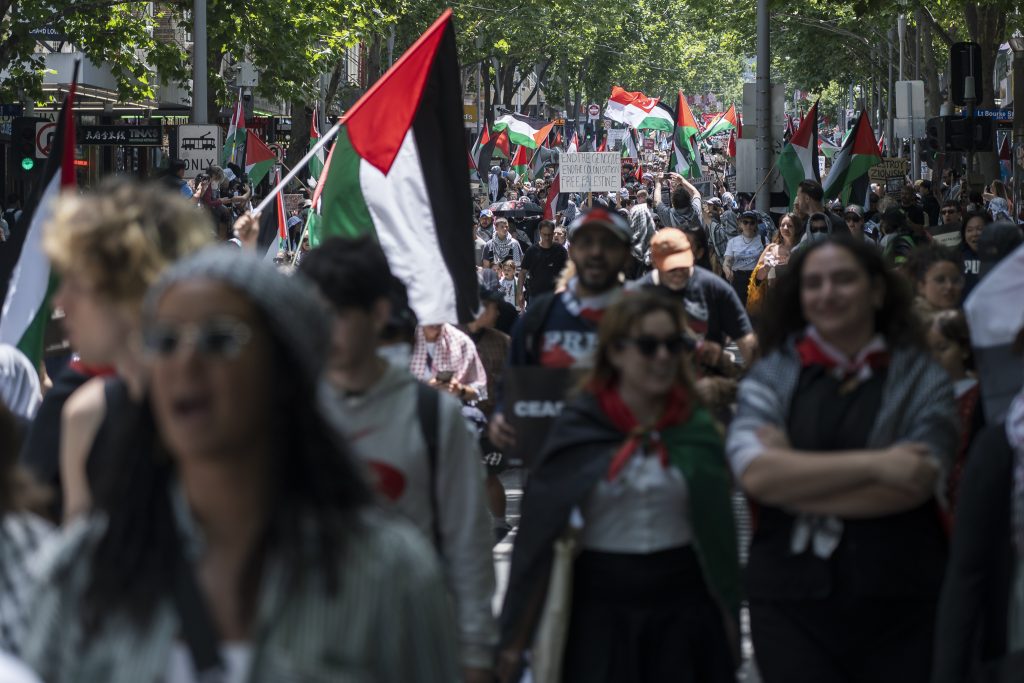
Photo Credit: Matt Hrkac
These activists understand the intersectionality needed for the frontline. The causes are inextricably linked, without being reductive to the long political history of the area. The conflict has caused mass innocent casualties, exhaustive emissions and biodiversity collapse. As director of the Palestine Institute for Biodiversity and Sustainability, Professor Mazin Qumsiyeh, who is also a member of Extinction Rebellion, states “There is both a genocide and an ecocide going on, supported by some Western governments against the will of the Western public”. There are also giant gas reserves off the coast of the Gaza strip which the US has already begun negotiations with Israel to extract.(13)
Brad: What signs of hope do you see in the broader movement, Violet?
Violet: The fact that the university students are really coming into their own resistance is very promising. Historically it is a tipping point in any movement when the youth engage in radical tactics.
A healthy democracy relies and depends on the freedom to demonstrate. It is the mark of a civilised society when space is created for open dissent and peaceful protest – as opposed to vilifying it.
As protests escalate and vested interests feel threatened, they respond by pulling political levers to legislate for harsher laws and create media slander campaigns. The scholars have named the intentional repression of activists strategic incapacitation(14),a tactic that is used all around the world.
Experience suggests that repression can have a chilling effect on some people, but it also hardens the resolve of activists who are already deeply committed to the cause. Many of us have started running prison 101 sessions so people can have informed consent on taking risks to continue to protest in the current political climate. Nobody wants to go to prison, but an increasing amount of our community are agreeing to participate in the global struggle to preserve life, even if the individual cost is the temporary loss of our freedom.
Being prepared to go to prison pulls two levers. Firstly, it means that we participate in very powerful actions, because we consent to the risks. By accepting the large cost of direct action, we express the seriousness of the cause. Another lever is the ‘backfire response’, where support from outraged sympathetic communities can lead to more active resistance.
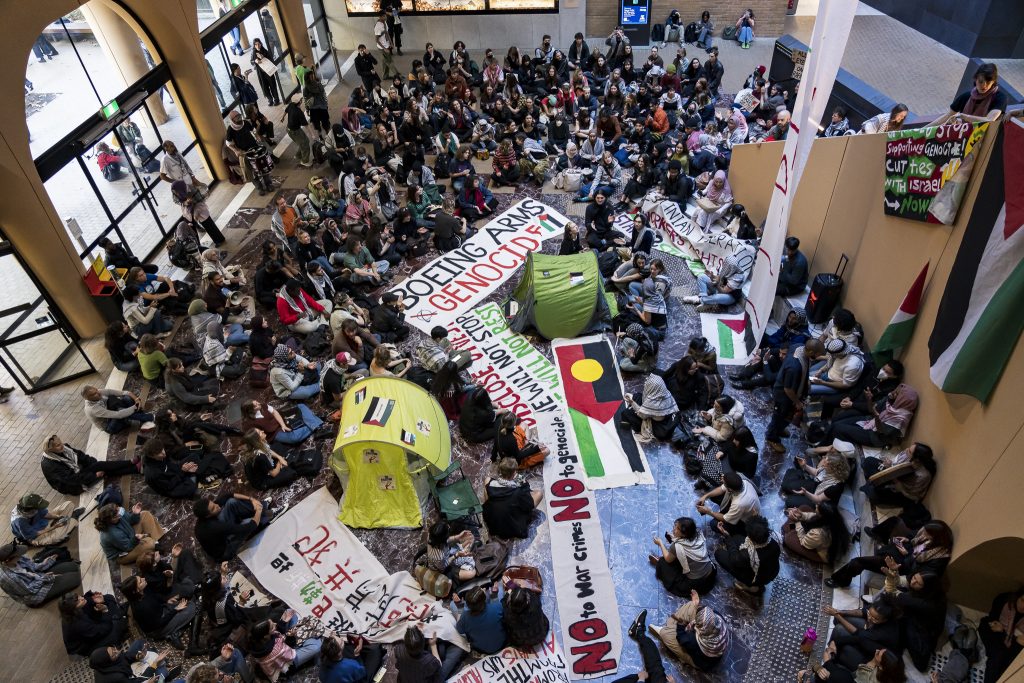
Photo Credit: Matt Hrkac
Brad: It is an unignorable part of studying civil resistance movements that eventually, if it gains any kind of momentum or success… people end up spending time in prison. Prison is not the goal, but we recognise the legal consequences of engaging in resistance that is proportionate to the extreme threats we face.
While we don’t think that protesters belong in prison, we are prepared to face that eventuality to try and trigger social change and expose the true nature of the state, which is inherently violent, especially regarding capital and economic growth.
Brad: I know we have debriefed a lot over the last week, but what stands out for you about your prison experience Violet?
Violet: The employees of Dame Phillis Frost Centre (DPFC) come in three main categories: The health staff, as part of Western Health. Then there are the volunteers and civilians who run the chaplaincy services, arts, and programs. Lastly, there are the guards, who are often called ‘screws’ or ‘key turners’,
Some of the screws are nice enough, they are there to do a good job, treat everyone as fair as they can. Other screws it seems, love the power trip of locking women up. One male screw had a tattoo of a woman in hand cuffs on his forearm.
There are staffing shortages as well, so they are all over worked, often working double shifts for 8-10 days in a row… which doesn’t make them keen to do a good job of caring for the women who are completely dependent on their whims.
Let’s also remember that a lot of women in Dame Phillis are there on remand, which means they have been denied bail, but not sentenced to prison yet. Often for crimes that they will not receive a jail sentence for but are literally serving time anyway.
Such is the case for a woman in my unit: Ashley, who almost died several times while I was in DPFC. Ashley came in looking very bad. It was assumed she was withdrawing from drugs, as she didn’t come out of her room, just staggered to line up for count and then went back to bed. However, later we found out that Ashley doesn’t do drugs, she was in fact, experiencing heart failure.
Ashley told us she was in for driving without a license, and she had a bail hearing in three days.
One day, Sally, a woman I had gotten close to, noticed that Ashley had not had her dinner, so she went to check on her. A job the screws should have been doing. Ashley was unresponsive and foaming at the mouth when Sally went to her cell. The screws locked down the unit and got Ashley to the hospital where she had a pacemaker put in her heart. When Ashley returned, after only three days, she told us that she was supposed to have court that day, however the prison had told her lawyer that she didn’t want to talk to them. Rather than telling Ashley’s lawyer that she was in hospital. Neither did they inform Ashley’s family of her health emergency. They had hushed it up. The same way they had tried to hush Veronica Nelson’s death in 2020.
Sally had been at been at DPFC the night before, and during the day that Veronica Nelson had died. That is what made her so vigilant at checking on her fellow inmates. She had heard Veronica screaming for help when she had died at DPFC on the 2nd of January 2020. If Sally had not checked on Ashley, it’s likely that there would have been another death on the prison’s hands.
I guess, thanks to cinema, most people’s perception is that the greatest threat in prison, is the other inmates. However, the scariest thing about being at DPFC was the fear I would get sick and be unable to get the help I needed from apathetic staff.
I was much safer than many other inmates due to my white privilege. The disproportionate representation of POC in prison really stands out. It’s staggering to me knowing that Aboriginal and Torres Strait Islander people comprise of just three percent of the population, yet they are 30% percent of deaths in custody.(15) This is a festering wound the nation won’t even address, let alone try to heal.
There are other stories, many other stories from the women at DPFC regarding health; one woman went blind, a baby died, infections went untreated, women in pain were ignored. When they finally did get in to see the doctor, the women reported sexual misconduct from medical staff.
Most of the women in DPFC are there for drug related offences. The links between drug use and trauma are stronger than the links between obesity and type 2 diabetes. Yet the trauma counselling has been defunded at DPFC. Another woman, Dannielle, was sentenced to prison with the magistrate saying, “In there you will get the counselling you need.” Yet when Danny applied for every service on the programs list, she was told they were all full or no longer offered. The courts seem to think that women are being healed in prison, yet they are only being re-traumatised and then fed back through the system. 48% of people who are incarcerated in Victoria’s prison system return within two years. This system is not working for anyone.
Let’s also remember, certain socio-economic groups have higher representation in prison. It’s a damning indictment on the neo-liberal economic system, and the current housing crisis, that people commit petty crimes in winter, just to get a warm bed and a regular feed.
This is a system in desperate need of reform and there is no shortage of evidence from around the world as to what does and doesn’t work. In saying all this, I would like to assure everyone that I remained mentally very well in prison due to my Buddhist training of mindful gratitude for the smallest things. The little birds outside my window were a great joy, the many letters I received kept me company when I might have felt alone and my support team who afforded me every grace possible, from sending in books and colourful socks to topping up my phone account so I could stay in touch with my family. I also drew great strength from the letters you sent me Brad. DPFC and Raven Hall share a fence, so Brad and I wrote letters to each other every day about the shared sunsets, birds, and dreams of what we would do when we were free.
Violet: Being inside was tough, we’ve spoke about this plenty over the last couple of days. Maybe starting with your time at the MAP, what would you like to share?
Brad: I was incarcerated for the first three weeks at the maximum-security Melbourne Assessment Prison (MAP), before being moved to the Koori unit at Ravenhall, where it was very evident that first nations people are, per capita, the most incarcerated people on the planet. I was also very cognisant of the higher risk for first nations people in custody – a subversive continuation of the genocide on this continent. I was humbled that our action was well supported in there and I made some genuine friends, including with the elder of the unit, who I would have a daily conversation with on the terrace, or in one of our cells.
I don’t intend to elaborate too much on the broader problems within the so-called justice system as Violet has quite comprehensively covered some ground that applies equally to the men’s system, but I would like to talk somewhat about the personal journey. Prison from a personal perspective is all about self-preservation, even after having a significant amount of experience with police station cells and being remanded in custody centres, being processed, and walked into a prison unit by a screw is a very intimidating experience.
Having been on this trajectory for some time, and having sought advice from friends and work colleagues who had done time, their words were front and centre in my mind, and served me well, but advice can only take you so far, and there’s nothing like first-hand experience for learning the ropes.
Self-preservation in custody requires the delicate navigation of two sets of rules, the written and the unwritten, and both have serious consequences, sometimes deadly. From my experience it also requires the suspension of one’s values. Most of the violence I witnessed was triggered by relatively trivial things, like saying the wrong thing to the wrong person. It was important to be constantly vigilant about the words that I used, and the state of mind of my fellow inmates, hence I rarely if ever fully relaxed, even once I had settled in.
I soon learnt that nobody is going around randomly attacking people for no reason, and that it was in my best interest to treat everyone I interacted with respect. I learnt to mind my own business and stay out of the prison politics as much as possible, something that got harder the longer I was in there, and the more friends I made. I did make friends, in fact it was very important that I did, and maintained those friendships to the best of my ability.
Boredom and monotony are two of the biggest challenges as there are only so many things we could do to pass the day. There is a lot of walking in circles and back and forth on basketball courts etc. This left me, like others, with very little choice but to establish a daily workout routine with weights and exercise equipment readily available at Ravenhall. This is also a great way to meet people and form friendships, as are other activities like basketball, football and pickle ball (a game I had not heard of before prison). I would also read and practice yoga daily.
Work is available and used as an incentive to get a “one out” which is a one-person cell. I chose not to work as I found the pay rate to be blatantly exploitative. With people being paid $8 for 6 hours work. I can understand why people doing longer sentences choose to work, as it helps pass the time. Unlike a lot people inside it helped greatly that I had a wonderful support network on the outside who made sure my account was topped up for canteen and phone calls every month. The letters of support I received were invaluable, including the daily letters that we would write to each other – my greatest source of strength and resilience.
“One out” cells are used as a reward for working and good behaviour, which is essentially state sanctioned violence because, a large proportion of the violence that occurs is due to incompatible people being forced to share calls. Causing fights over petty things like who gets the bottom bunk, hygiene habits, sleeping patterns, TV viewing etc. Getting a good cell mate is half the battle.
The evidence from around the world is that the harsher the prison the higher the rate of recidivism. This is not helped in Victoria by the fact that regardless of the crime one has committed, everyone starts out at the Melbourne Assessment Prison, which is a maximum-security prison, and are often moved to Port Philip – one of the most violent and feared prisons by inmates.
Violet: What is happening with Joe, do you think he will also go to prison for being on the truck with us?
Brad: Joe Zammit, is yet to face court. As this matter is still before the courts, it would be prudent of us to not make comment. Suffice to say, I hope Joe, our friend and a kind soul, doesn’t go to prison.
Violet: Yes, I hope Joe is safe, as I do all my friends, many of whom are engaging in civil resistance. For example, Daisy and Tony, who glued themselves onto the picture frame of Picasso’s 1951 anti-war expressionist painting, they may go to prison.
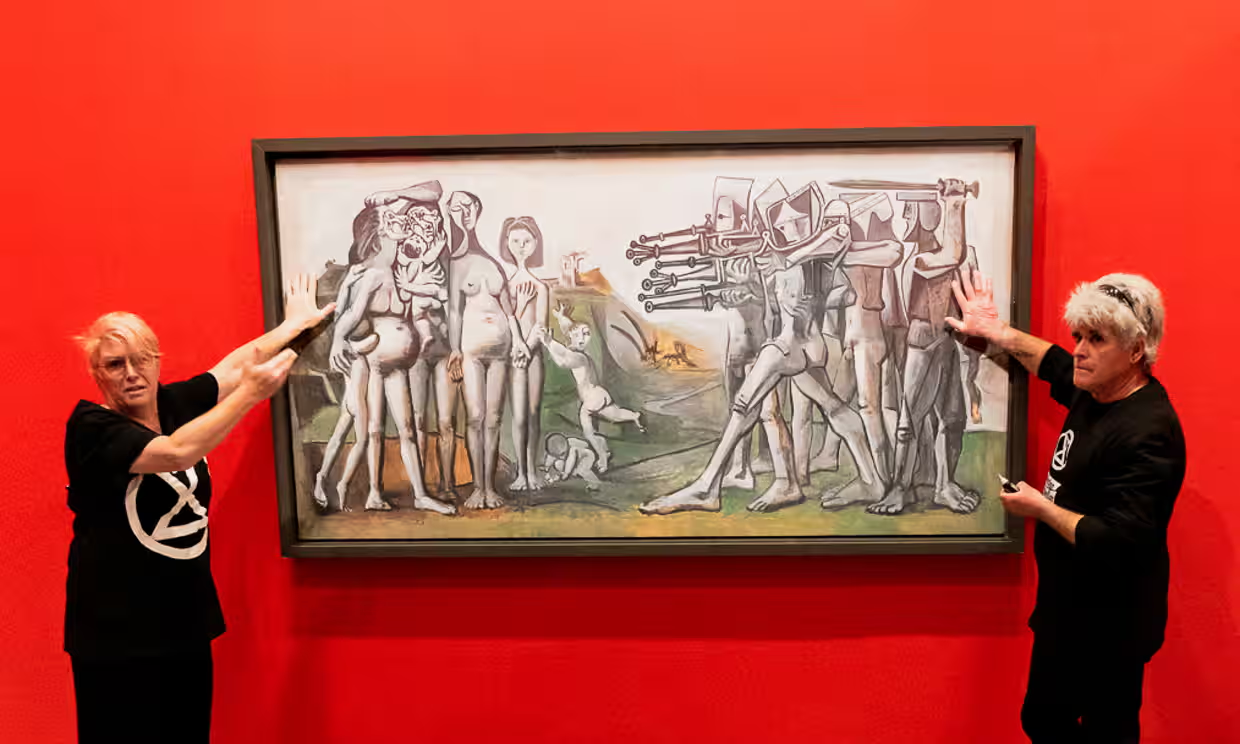
Photo Credit: Matt Hrkac
Also, Colette, who does actions mostly to protect native forests, like Takayna. It looks like they might get 6 months. They have already served 3 months. Brad and I have court in Tasmania coming up for also defending the native forests.
Brad: I also have court coming up in Melbourne for an action we did a few years ago Where we blockaded an Exxon Mobil facility. I will be pleading not guilty on the grounds of necessity, in the context of the climate and ecological emergency. And yes it will be interesting to see how we both go with our matters in Tasmania now that the government has dramatically increased the penalties. Also, in light of the dream I had my last night at Ravenhall that involved a Tasmanian prison cell.
Violet: The reality is that what we do right now matters, and people are willing to take proportionate action to the threat, regardless of personal cost. That is a good sign for humanity in a very dark hour.
Brad: What’s next for the grassroots movement?
Violet: We need to be prepared to act in proportion to the threat. Be as radical and disruptive as possible. We must be prepared to sacrifice our comforts, our time, and for some of us, our liberty. It is vital that we suspend doubt that we can make a difference – for this guarantees that trajectory.
Do not give into doomerism, instead, find active hope. We need to be working together, for our movement to be big enough, and powerful enough, to make real change. Then we must be prepared to take action with people across a wide spectrum of society. If we are not challenged by our coalition, then our coalition isn’t big enough. So, make more friends and let’s take bold, collective action together.
Violet: So through all this willingness to sacrifice, what world are you hoping to create?
Brad: I’m fighting for a world that is ecologically sustainable – where the beauty and wonder of the natural world can be enjoyed by all. A world where everyone’s basic needs are guaranteed. Where all people are given the opportunity to live and thrive in peace and harmony.
This article was written on stolen land of the Boonwurrung people of the Kulin nation and the Pallawa and Pakana peoples country in Lutruwita. We pay our respects to elders past and present and acknowledge First Nations people as sovereign to their land. Treaties were not signed, sovereignty never ceded.
References
- Spratt, D., Dunlop, I., & Schellnhuber, H. (n.d.). THE UNDERSTATEMENT OF EXISTENTIAL CLIMATE RISK. Retrieved November 30, 2022, from https://www.breakthroughonline.org.au/_files/ugd/148cb0_a0d7c18a1bf64e698a9c8c8f18a42889.pdf, p3.
- Climate Breakdown Has Begun with Hottest Summer on Record, Secretary-General Warns, Calling on Leaders to “Turn Up the Heat Now” for Climate Solutions | UN Press. (n.d.). Press.un.org. https://press.un.org/en/2023/sgsm21926.doc.htm
- Australian scientists warn urgent action needed to save 19 “collapsing” ecosystems. (2021, February 25). The Guardian. https://www.theguardian.com/environment/2021/feb/26/australian-scientists-warn-urgent-action-needed-to-save-19-collapsing-ecosystems
- United Nations Peacekeeping. (2019). Conflict and natural resources. United Nations Peacekeeping. https://peacekeeping.un.org/en/conflict-and-natural-resources
- Environmental Audit Committee. (2023). Environmental change and food security – Report Summary [Review of Environmental change and food security – Report Summary]. the House of Commons. https://publications.parliament.uk/pa/cm5804/cmselect/cmenvaud/312/summary.html
- Former defence chief says government “doesn’t understand” climate change risk to Australia’s security. (2024, May 1). ABC News. https://www.abc.net.au/news/2024-05-02/national-defence-strategy-ignored-climate-risks/103789018
- Climate change a “bigger threat than China”: Chris Barrie. (n.d.). Amp.smh.com.au. Retrieved June 3, 2024, from https://amp.smh.com.au/politics/federal/bigger-threat-than-china-defence-leaders-urge-release-of-scary-climate-report-20230404-p5cxuf.html
- Rising climate risks: Why accessible, affordable home insurance is under threat. (n.d.). AdaptNSW. https://www.climatechange.environment.nsw.gov.au/news/rising-climate-risks-why-accessible-affordable-home-insurance-under-threat
- Disaster alley: Climate change, conflict and risk | PreventionWeb. (2017, June 21). Www.preventionweb.net. https://www.preventionweb.net/publication/disaster-alley-climate-change-conflict-and-risk
- Climate change could be “catastrophic” for this beloved bird. (2022, February 19). ABC News. https://www.abc.net.au/news/2022-02-20/magpies-face-bleak-future-from-rising-climate-change-heat/100843148
- UNFCCC. (2021). History of the Convention. Unfccc.int. https://unfccc.int/process/the-convention/history-of-the-convention
- Brehm, J., & Gruhl, H. (2024). Increase in concerns about climate change following climate strikes and civil disobedience in Germany. Nature Communications, 15(1), 2916. https://doi.org/10.1038/s41467-024-46477-4
- U.S. to Push Israel on Allowing Gaza Offshore Gas Reserves to Revitalize Palestinian Economy. (n.d.). Haaretz. https://www.haaretz.com/israel-news/2023-11-20/ty-article/.premium/u-s-to-push-israel-to-allow-gaza-offshore-gas-reserves-to-revitalize-palestinian-economy/0000018b-ed90-ddc3-afdb-fdd1ff250000
- Kelly, A. (2019, December 8). What is “Strategic Incapacitation” and why is it important for activists to understand it? • Melbourne Activist Legal Support. Melbourne Activist Legal Support. https://mals.au/2019/12/08/what-is-strategic-incapacitation/
- McAlister, M., Miles, H., & Bricknell, S. (2023). Deaths in custody in Australia 2022-23. Australian Institute of Criminology. https://doi.org/10.52922/sr77222
- McBay, Aric, (2019), Full Spectrum Resistance: Building Movements and Fighting to Win. Seven Stories Press.
Violet CoCo is an activist for environmental protection. Most recently she spent two months in prison for blockading 3 lanes of the West Gate Bridge in Naarm/Melbourne. The protest with Extinction Rebellion called for a climate emergency declaration. In December 2022, she was the first person sentenced under controversial new anti-protest laws in NSW, receiving a sentence of 18 months in prison for blocking the harbour bridge under the banner Fireproof Australia. Her sentence was dropped on appeal, after doing time in Silverwater prison. Violet has been arrested 38 times, and has been imprisoned five times, including for famously burning a pram outside Parliament House on the same day the IPCC declared a Code Red for Humanity due to climate breakdown. Violet Coco advocates for peace, Justice and a liveable planet. She has been a part of organising major disruptive festivals of civil disobedience with many parts of the environment movement, supported First Nations and the decolonization of so called ‘Australia’, while also advocating for justice for women, refugees, and queer communities. If you would like to support Violet’s activism, you can do so here.
Brad Homewood is a father and until recently he was a full time truck driver in the construction industry. Since 2019 he has been engaging in direct action as a dedicated climate and ecological activist. Most recently he spent two months in prison for using a truck to block traffic on the West Gate bridge in Naarm/Melbourne calling for a declaration of a climate emergency. Brad has been arrested 16 times while mobilising predominantly with Extinction Rebellion, Blockade Australia and more recently the Bob Brown Foundation.He’s also challenging the courts, by pleading not guilty, under the emergency defence for a blockade at Exxon Mobil. Brad is also a peace activist, a regular volunteer with Pay the Rent, and endeavours to be the best possible Allie he can be to oppressed people everywhere. If you would like to support Brads activism, you can do so here.
Image Credit. Photos by Extinction Rebellion and Matt Hrkac.
